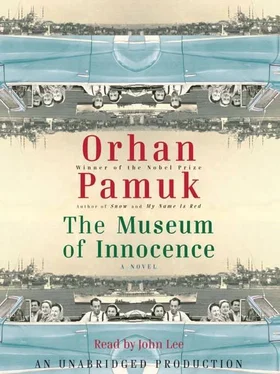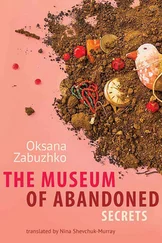The device by which the Keskin family actually kept time was the television, which, like our radio during the fifties and sixties, was always on. In the days of radio, no matter what the broadcast-a piece of music, a discussion, a mathematics lesson, whatever-you would hear a soft blip on the hour and the half hour, for the benefit of those who cared to know. In the evenings, when we watched television, there was no need for such a signal, as most people had no need to know the time unless they were trying to find out what was on television.
Every evening at seven o’clock, when the enormous clock appeared on the screen a minute before TRT, the country’s only television station, began its news program, Füsun would look at her wristwatch (displayed here) as Tarık Bey looked at one of the many pocket watches I saw him use over that eight-year period-either to confirm they had the correct time or to adjust their watches to it. They would do this. It was deeply satisfying to watch Füsun sitting at the supper table, gazing at the enormous clock on the screen and squinting, pressing her tongue against the inside of her cheek as she calibrated her watch with the seriousness of a child copying her father. From my very first visits, Füsun was aware how much I enjoyed this spectacle. When she adjusted her watch, she knew I was observing her lovingly, and when she got the time right, she would look at me and smile. “Do you have the time right now?” I would ask her just then. “Yes, I’ve got it!” she would say to me, with a smile that was even warmer.
As I would slowly come to understand over the eight years, it was not merely to see Füsun that I went to the Keskin house but to live for a time in the world whose air she breathed. This realm’s defining property was its timelessness. And so it was that Tarık Bey advised his wife to “forget time.” When people come to visit my museum and view all the Keskins’ old possessions-especially all these broken, rusting clocks and watches that haven’t worked for years-I want them to notice how strange they are, how they seem to exist out of time, how they have created among themselves a time that is theirs alone. This is the timeless world whose air I inhaled during my years with Füsun and her family.
Beyond this timeless space was the “official” time outside, with which we kept in touch through television, radio, and the call to prayer; when we talked about finding out what time it was, we were organizing our relations with the outside world, or so I felt.
Füsun did not adjust her watch because life as she lived it called for a clock that was accurate to the second, so that she could be punctual for work or some meetings; like her father, the retired civil servant, she did so as a way of acceding to a directive signaled to her straight from Ankara and the state, or so it seemed to me. We looked at the clock that appeared on the screen before the news much as we looked at the flag that appeared on the screen, while the national anthem was playing at the end of the broadcasting day: As we sat in our patch of the world, preparing to eat supper or bring the evening to a close by turning off the television, we felt the presence of millions of other families, all doing likewise, and the throng that was the nation, and the power of what we called the state, and our own insignificance. It was when we were watching flags, Atatürk programs, and the official clock (once in a while, the radio would refer to the “national time”) that we were most keenly aware that our messy and disordered domestic lives existed outside the official realm.
In Physics Aristotle makes a distinction between Time and the single moments he describes as the “present.” Single moments are-like Aristotle’s atoms-indivisible, unbreakable things. But Time is the line that links these indivisible moments. Though Tarık Bey asked us to forget Time-that line connecting one present moment to the next-no one except for idiots and amnesiacs can succeed in forgetting it altogether. A person can only try to be happy and forget Time, and this we all do. If there are readers who sneer at the things my love for Füsun taught me, at these observations that arise from my experiences during the eight years at the house in Çukurcuma, I would like to ask them please to be careful not to confuse forgetting about Time with forgetting about clocks or calendars. Clocks and calendars do not exist to remind us of the Time we’ve forgotten but to regulate our relations with others and indeed all of society, and this is how we use them. When looking at the black-and-white clock that appeared on the screen every evening, just before the news, it was not Time we remembered but other families, other people, and the clocks that regulated our business with them. It was for this reason that Füsun studied the clock on the television screen to check if she’d adjusted her watch “perfectly,” and perhaps it was because I was looking at her with love that she smiled so happily-and not because she’d remembered Time.
My life has taught me that remembering Time-that line connecting all the moments that Aristotle called the present-is for most of us a rather painful business. When we try to conjure up the line connecting these moments, or, as in our museum, the line connecting all the objects that carry those moments inside them, we are forced to remember that the line comes to an end, and to contemplate death. As we get older and come to the painful realization that this line per se has no real meaning-a sense that comes to us cumulatively in intimations we struggle to ignore-we are brought to sorrow. But sometimes these moments we call the “present” can bring us enough happiness to last a century, as they did if Füsun smiled, in the days when I was going to Çukurcuma for supper. I knew from the beginning that I was going to the Keskin house hoping to harvest enough happiness to last me the rest of my life, and it was to preserve these happy moments for the future that I picked up so many objects large and small that Füsun had touched, and took them away with me.
Late one evening, during the second of the eight years, when the television stopped broadcasting for the night, I listened to Tarık Bey’s memories of his time as a young teacher in Kars Lycée. If he had fond memories of these unhappy years, when he was alone and scraping by on a low salary, suffering many misfortunes, it was not because bad memories grow rosier with the passage of time, as most people believe, but because he enjoyed talking about the good moments (the particles of Now) from that troubled phase of his life (beads inevitably strung on that evil line, Time). It was after he had noted this paradox one evening that he remembered for some reason the “East-West” watch he’d bought while in Kars, which he brought out to show me had two faces, one in Arabic numerals, and the other in Roman.
Let me elaborate this theme with another timepiece: when I see this slender Buren wristwatch that Füsun began to wear in April 1982, what appears before my eyes is the moment when I gave it to Füsun on her twenty-fifth birthday, and the moment when, after she had taken it out of its now lost box, with her parents elsewhere (and Feridun not at home), she kissed me on the cheek, behind the open kitchen door, and the moment when we were all sitting together and she joyously showed the watch to her parents, and the moment when her parents, having long accepted me as an eccentric member of the family, each thanked me in turn. For me, happiness is in reliving those unforgettable moments. If we can learn to stop thinking of our lives as a line corresponding to Aristotle’s Time, treasuring our time instead for its deepest moments, each in turn, then waiting eight years at your beloved’s dinner table no longer seems such a strange and laughable obsession but rather (as I would discover much later) assumes the reality of 1,593 happy nights at Füsun’s dinner table. Today I remember each and every evening I went to supper in Çukurcuma-even the most difficult, most hopeless, most humiliating evenings-as happiness.
Читать дальше












